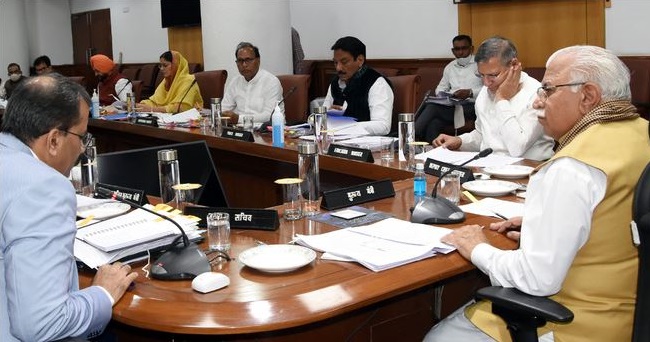 English
English

The Haryana Cabinet has unveiled a paddy stubble management policy aimed at utilising paddy straw for sustainable energy and completely curbing crop residue burning practices by 2027.

Chandigarh: The Haryana Cabinet has unveiled a paddy stubble management policy aimed at utilising paddy straw for sustainable energy and completely curbing crop residue burning practices by 2027.
The "Haryana Ex-Situ Management of Paddy Straw Policy 2023" is aimed at harnessing paddy straw for sustainable energy and eliminating crop residue burning by 2027, said an official statement after a meeting of the cabinet, which was held under the chairmanship of Chief Minister Manohar Lal Khattar.
The policy provides a framework for attracting private investment in paddy straw-based projects while encouraging farmers to engage in responsible practices, establishing a robust linkage between farmers and industries.
The state government is dedicated to providing crop residue management (CRM) machines to farmers at a subsidy, with 19,141 lakh machines already sanctioned to the farming community. An area of 940 lakh acres has been registered for incentives of Rs 1,000 per acre.
This commitment is reflected in the recent notification issued on October 30, 2023, introducing the "Haryana Ex-situ Management of Paddy Straw 2023" scheme.
Haryana Chief Secretary Sanjeev Kaushal said that 90 per cent of paddy harvesting in the state has been completed, and the state government is actively bolstering its measures to combat stubble burning.
During a virtual meeting convened by the Union Cabinet Secretary, Kaushal emphasised the government's relentless efforts to curtail stubble burning and proactively minimise fire incidents, thus reducing air pollution in the National Capital Region (NCR).
Providing insights into the government's endeavours, he disclosed that Haryana cultivates 36.5 lakh acres of paddy, comprising 18.36 lakh acres of basmati cultivation and approximately 18.2 lakh acres of non-basmati cultivation.
Sanjeev Kaushal highlighted the state government's vigilance over the Air Quality Index and its stringent measures to further reduce paddy straw burning.
He informed that there has been a 38 per cent reduction in stubble-burning incidents in 2023 compared to the previous year, with a substantial 57 per cent reduction observed in the last two years.
Furthermore, Kaushal highlighted the steps taken by the state government, such as issuing instructions to hold Deputy Commissioners and Station House Officers liable for not controlling these fires.
The government has also taken strict action against individuals responsible for farm fires, issuing 1256 challans with fines totaling over Rs. 32.55 lakh and filing 72 FIRs related to farm fires. A total of 44 farm fire instances were extinguished.
Kaushal said that the state government has imposed restrictions on BS-III petrol and BS-IV diesel LMVs (4-wheelers) in the Gurugram and Faridabad districts with immediate effect until November 30 or until the revocation of GRAP Stage III by the Commission on Air Quality Management, whichever occurs earlier (excluding vehicles deployed in emergency services, police vehicles, and government vehicles used for Enforcement).
Violators found using BS-III Petrol and BS-IV Diesel LMVs (4-wheelers) in these districts will face prosecution under Section 194(1) of the Motor Vehicles Act, 1988.
Regarding the fixation of hologram-based colour stickers on vehicles registered in NCR districts, he said that approximately 10 lakh vehicles have been colour-coded in NCR districts between November 14, 2018, and January 31, 2023.
He reiterated the state government's commitment to eliminating unsustainable practices like paddy straw stubble burning, emphasising support for farmers through a subsidy of Rs 600 crore for adopting various stubble management practices.
The use of Pusa Bio Decomposer on over 5 lakh acres through CSR initiatives further demonstrates this commitment.
Haryana's comprehensive strategy includes both in-situ and ex-situ management, with a focus on categorising villages into red, yellow, and green zones based on active fire incidents.
The state government is dedicated to providing crop residue management (CRM) machines to farmers at a subsidy, with 19141 lakh machines already sanctioned to the farming community. An area of 940 lakh acres has been registered for incentives of Rs 1000 per acre.
This commitment is reflected in the recent notification issued on October 30, 2023, introducing the "Haryana Ex-situ Management of Paddy Straw, 2023" scheme.
This initiative aims to ensure the assured and adequate supply of paddy straw to biomass-based projects, thereby reducing stubble burning and promoting environmentally conscious agriculture.
The projected industrial utilisation of 13.54 lakh metric tonnes of paddy straw for the current year further underscores the state government's efforts in this direction. (ANI)
No related posts found.